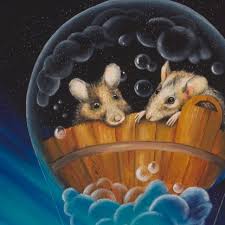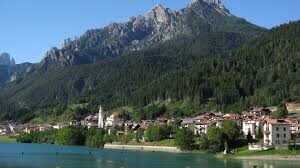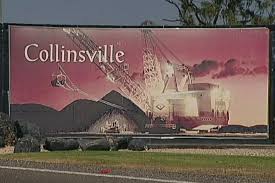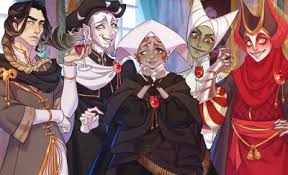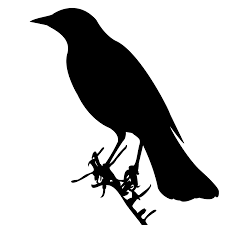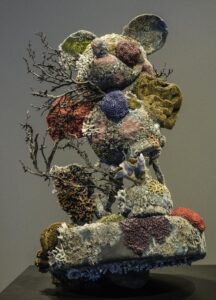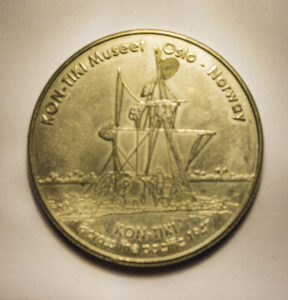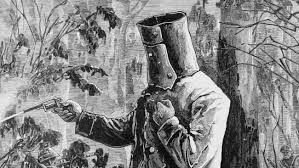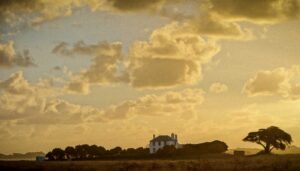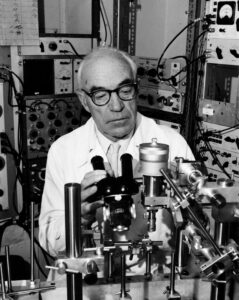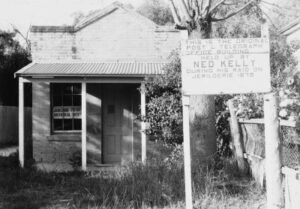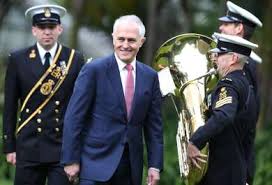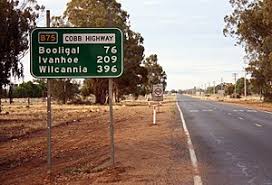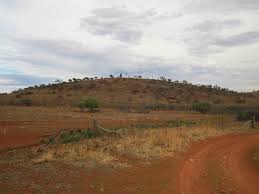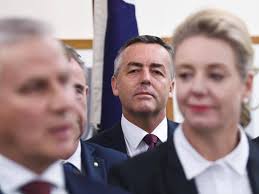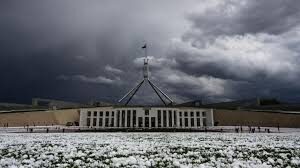They come in their work clothes and their steel-capped boots, climbing on board the QantasLink plane at Devonport; or disembarking at the same airport. They are the FIFO miners who work on the ore rich West Coast of Tasmania. They have living quarters on the edge of Zeehan and in Rosebery while they are on work down the mine, since 50 per cent of the miners choose not to live permanently on site. Interestingly one per cent of Tasmanian miners are listed as working in the East Pilbara in Western Australia.
Paradoxically, the Mt Lyell mine at Queenstown, the largest settlement on the West Coast, has been closed down for nearly five years. Its Indian parent company in the same period closed its copper smelter in India, but claims there is no connection between the two decisions. However, Queenstown exists as the local government centre amid denuded hills, a settlement desperately clinging to its existence. The beautiful King River, polluted for over 70 years by the mine tailings from Mount Lyell, is said will take 200 years to restore, but at least a start has been made to cover the riverside that was yellow with sulphur with sedge and other littoral plants. Over the last 20 years you can see that change.
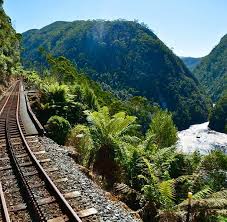
It’s a bit sad to see that the old anti-climate change warrior from Tasmania, Eric Abetz remains solidly behind the coal lobby given how little coal mining contributes to the Tasmanian economy – less than 100 jobs. Eric moreover was outed for spending $3,000 on a trip to go to an Australian Mines and Metals Association conference in 2018 in Melbourne. He is reported as saying his travel was appropriate “given the undisputed importance of the sector to Tasmanians. Tasmania’s Mt Lyell mine has been the sole continuous AMMA member”, Abetz said. As the report noted as a postscript, as Eric should have known, “it was no mean feat, considering the mine had been mothballed four years before the gala dinner.”
But then Eric comes from Hobart and I wonder how often he has visited the West Coast – if ever. There is much mining – zinc, iron ore, gold, tin – but no longer from Mount Lyell. There are mines near Zeehan, Rosebery, Tullah and up on the Savage and Henty Rivers. However, if you live in Hobart, the Tasmanian West Coast may as well be on the moon.
I have been going regularly to the West Coast for more than 20 years and yet those towns look the same as they were then, except for the increase in hostel-like accommodation for the FIFO. In other words, these towns have not boomed in population as Queenstown did after the discovery of copper and silver in the late nineteenth century. The need to transport the ore resulted in Strahan on the Macquarie Harbor becoming the conduit port (again the population reached 2,000 then) and the revolutionary Abt railway was the means to transport the ore over the mountains and through the rain forest along the King River from Mount Lyell.
Strahan is now a tourist resort and the Abt Railway, which was closed in 1963, has been rebuilt as a tourist attraction. Strahan also still functions as a fishing port – crayfish and abalone – and in the harbour, salmon farming. There are the leatherwoods, the flowers of which provide the nectar for the distinctive honey found here. Even with the mining, there is still this extraordinary temperate rainforest of myrtle, native beech, sassafras, blackwood and the remnant clumps of pine unique to Tasmania – huon, king billy and celery top pine.
Because the changes in the mining industry from the stereotype beloved by those who never go to a mining town, it is difficult to imagine a settlement to have a life once mined out. But people like Abetz would throw money at Mount Lyell in the mistaken belief that it would result in more jobs, irrespective of the return. In most part the company would probably just pocket the subsidy.
As I said, there is still a healthy mining industry – the whole of the West Coast is a mineralised area, and taking just one mining industry, that of zinc mining at Rosebery (population 713) and Zeehan (population 708), it yields about a third of Australia’s output in zinc; and Australia produces about 30 per cent of the world’s zinc. Unlike coal, zinc is unlikely to be replaced because of its recognized use not only in sunscreen but more importantly in galvanizing iron and in the development of electric batteries for cars.
However even with such important mining activity, the resident population of these two mining towns on a rough calculation is equal to the number of FIFO. It should be added that 30 per cent of the zinc is recycled and here, in employment terms, the Swiss-owned smelter near Hobart at Risdon has played an integral role. The problem with mining in Tasmania is that the West Coast is the last area of untouched temperate rain forest in Australia, brought into stark relief – literally – by the bushfires along the east coast from Queensland to the Victorian border. So mining is a case of treading carefully, having learnt from Mount Lyell as an example of what not to do to the environment.
Wind turbines being placed at Granville Harbour are providing 200 jobs during construction, but for maintenance only 10. That, together with the FIFO, means that in the end it is not the technology nor the resources which provide the essence of life anywhere.
Tourism brings 300,000 to the North-West and West – people are the life blood, especially as the Macquarie Harbour boat trip and the reconstructed Abt Railway are the prime attractions, with Strahan the prime place to stay.
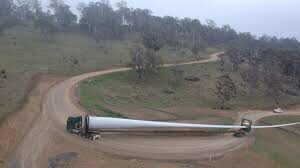
Oh, by the way, dear Eric, you should witness the huge wind turbines being moved down the Murchison Highway, round the corner through Zeehan and on up the road to eventually reach Granville Harbour. Wind and rain are the West Coast’s resources to be exploited, and soon the mighty wind resource of the Forties gales will be added to the Tasmanian power grid.
However, given how irrelevant coal is to the economy of Tasmania, I presume your time as a “coal war warrior” will soon be over, your task completed, but as you drive your Tonka tip truck off into a smoked filled sunset, remember your West Coast and its wonderful diversity.
The Martini
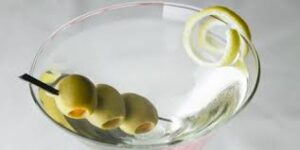
I enjoy a gin martini. My wife makes a very good martini and this blog was prompted by an article on the (alleged) best martini maker in the world opining on how to make the best martini. However the Best Martini was somewhat different from that of the expert.
First of all keep the gin in the freezer. This ensures that you’ll know if the gin has been watered down, because if it partially freezes you know there is dilution. Also if you keep the gin in the freezer, it makes the question of shaken or stirred irrelevant.
Next, “vermouth” the glass with green Noilly Prat; here there is no disagreement with yon expert, but it is a question of the amount. The Best formula calls for one in eight and then the gin from the freezer is poured into a chilled martini glass. And again in agreement, the lemon twist is the best addition to this opulent drink, but if you want to fiddle then if you must use three olives on a gold stick. Gold is important as it gives the olives a certain je ne sais pas quoi dire.
However, the problem is the cost of such a drink and the level of sobriety after two if you forsake the ice. There is no dilution if you pour straight from the freezer.
Which reminds me of that hoary old joke beloved by Latin teachers: Cassius Brutus clanks into the Vinum Bar in Rome and asks for a Martinus. The bartender responds: “surely you mean a martini?” to which Cassius Brutus said: “if I wanted two I would have ordered so”.
The best martini apart the uxorious one described above I ever had was a cucumber infused martini in New York. It was not the faintly cucumberish Hendricks, but a more full flavoured version. The nearest I could find was the Gordon’s cucumber infused gin in the green bottle, but I think I must have bought the last bottles in Australia. You garnish with a partially peeled piece of cucumber.
Have not seen any sign of the Gordon’s Green; only its seeming replacement of pink gin…only in Raffles in Singapore please, as I slightly shudder.
Bernie Sanders Heartland
A 78 year old who has had a heart attack, who now won’t release his medical notes – bad sign, Bernie. In the information vacuum, the obvious first thought is that he has irreversibly damaged cardiac muscle and therefore a heart at risk.
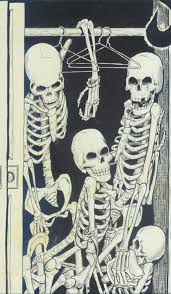
Then we have a President who mysteriously disappeared into and out of the Walter Reed Hospital. Nobody knows what incantations were said while he was in the hospital. However, Trump’s cupboard is probably the most comprehensive collection of skeletons known to man or woman such that another one as the grim reaper would feel at home.
These old crocks are the marvels of modern American medicine – particularly cardiac care where investigative procedures, stenting and improvement in medication are first rate. American health care (as distinct from the system in which it exists) at its best is probably as good as you would get in the world, if you can afford it and go to wise doctors.
You see modern medicine has enabled an obese, insomniac narcissist with a poor diet and the other who looks madly stressed as if he going to blow a fuse every time he speaks, to be President of the USA.
Just as Nixon thrashed McGovern in the 1972 election, if they survive until November, Trump should win the battle, even though Sanders may appear to be a better bloke.
The other man Joe Biden is just a broad grin, which hides a mediocrity clearly demonstrated by his propensity for plagiarism. His major advantage is he seems physically fit, but old age is not a fair hand in the card game of life.
They said how poor Bloomberg was in the recent debate and how politically incorrect he had been in the past. He does not have the populist orator skills that the others have, with their confected outrage. He is old but he wears his age well without panda eyes or comb overs.
His responses where he was allowed to answer were sensible given that the moderators were appalling. He brings a sense of surety, that on the major policies he will see them through. Like many quiet men he carries a big stick, and Trump just will be no match for him, the longer the campaign goes. He knows how to deal with serial grifters like Trump, and if he secured the nomination he will drive Trump mad with his quiet probing, and as he may say if he was as vulgar to Trump – the fact is that, Trump ol’ boy, I have a bigger one than you have – war chest I mean.
But Bloomberg also is no spring chicken, although he has the gravitas that even in four years he may be able to resurrect America from its policy shambles. It is all very well to have a world economy built on gambling , even if there are fancy names for it, such as stock markets, hedge funds plus all those indices, which may as well be on a bookmaker’s chart. Of course, Bloomberg has built his empire as the steward of these goings-on.
If the Democrats come to their senses, and if Bloomberg is selected, then Pete Buttigieg should be considered for his Vice-President running mate, to test whether an openly gay married man will be acceptable to the majority of Americans. Buttigieg is smart and personable, but not this time, brother.
They who read the blog may say I’m a “typical male who has ignored the two women”. Simply put, America needs a different woman prototype to appeal to the whole electorate. Warren, with her artificial outrage would gain votes, but she suffers from a lack of sense of humour and her candidature is now on life support. The problem with the plethora of women who thought of doing a “Hilary” and have progressively dropped out is that their presence has obscured how impressive Governor Klobuchar is, but she too is in danger of disappearing.
To me on the stump if Trump and Sanders are the 2020 presidential combatants they are equally repellent, but then I do not have a vote, only an opinion. That doesn’t get you anywhere; but the prospect of candidates dying on the campaign trail is too macabre – and frankly, just a bit too close to reality. Moreover, it is not the time for old men.
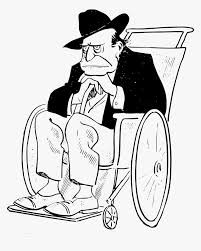
They will not be around to be cheered or booed at the end of 2050 if the world is still belching the same level of pollution and progressively destroying the world that we have known, but will not live to see. The same can be said for all those old men, as well as Elizabeth Warren.
The Price of Never Being Wrong
The problem with epidemics is they thrive on ignorant national leaders, who have no idea of public health, suppressing inconvenient information. This increasing government secrecy is coupled with the modern version of the courtier castrati, people without ideas but with perfumed phrases whispering into the ear of national leaders who have lost the ability to apologise.
I once wrote a small monograph entitled “The Dilemma of the Public Health Physician” in which I attempted, as I said, “to help public health physicians to work through the situation which confronts many professionals when they are in possession of information which others perceive as ‘sensitive’ or valuable in any respect.”
I went on to argue that all public health information should be freely available. The problem is that many public health physicians exist for the collection of data and not for the best way to make it available to the community. But communication skills have never been emphasised as they should be, because even over 20 years ago I wrote; “there is an increasing tendency for the political walls to be daubed with the graffiti of misinformation”.

This current epidemic will test those countries, especially China and Russia, whose leaders’ powers lie in secrecy and misinformation, to become more open. This epidemic will not be the last, given that the world with rising temperatures throughout, is increasingly becoming an incubator for exotic diseases.
Added to this viruses jumping from one species to another, mutating, being always ahead of the game … so no more pangolin penis eating in the restaurants of Asia, please. I assure you it doesn’t help virility only the possibility of a new virus – that is if the pangolin revenge is not already been enacted across the world.
On reflection am I just succumbing to daubing those political walls? Well, that is the point – public health expertise is being allowed not only to languish but to be ignored as an inconvenience. But as many politicians have found out in the past, “wishing an inconvenience would go away” is not a solution.
Having said that it seems we are fortunate in Australia not only to have the calming influence of Brendan Murphy, but also his unheralded deputy Paul Kelly who, unlike his boss, is a public health physician. Their influence on the government where there is a high level of ignorance is, and will continue to be, important. After all, as I wrote they have an imminent dilemma, which I have previously canvassed, which is when is Australia going to lift the ban on unrestricted entry into this country?
That is why the public health physician is as important as members of the police in enforcement of the basic requirements of public health, even down to all Australians washing hands as a matter of course.
Mouse whisper
I am sorry but I cannot let this recent comment by Sanna Marin, the Finnish prime minister, go by without applauding:
“We Finns have our sauna. And traditionally, it is where we make decisions. So now we have five women in charge, we can all go into the sauna together and make the decisions there.”
“Ei vain miehet vapauttavat kuumaa ilmaa”, says my old Finnish great-grand father mouse Aarvo.
That is the last comment he will ever make. They will be after him with birch branches.
